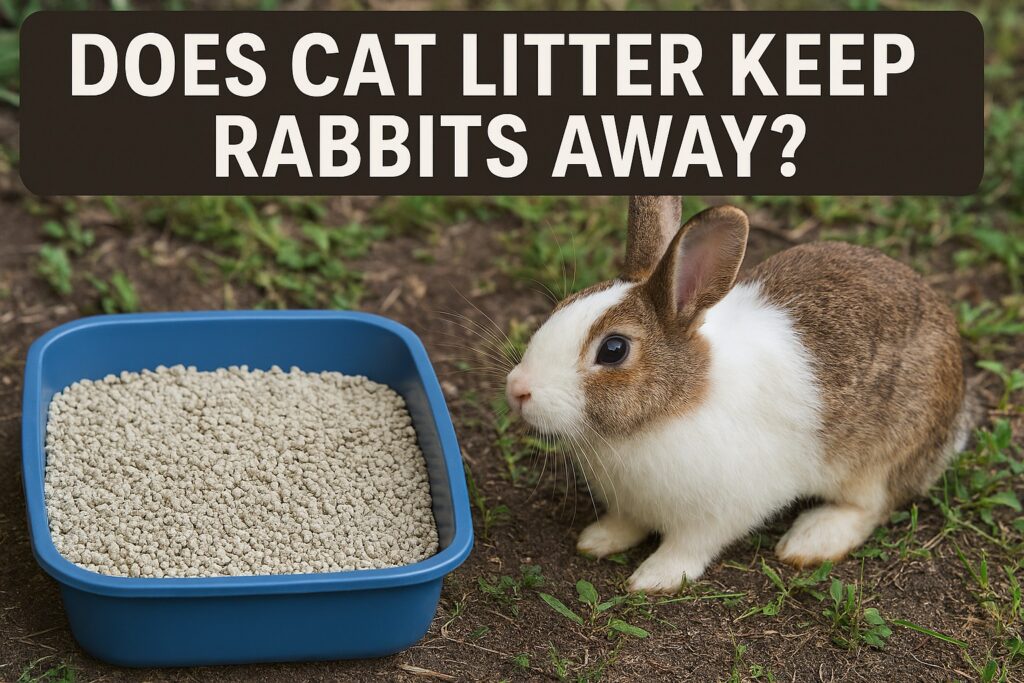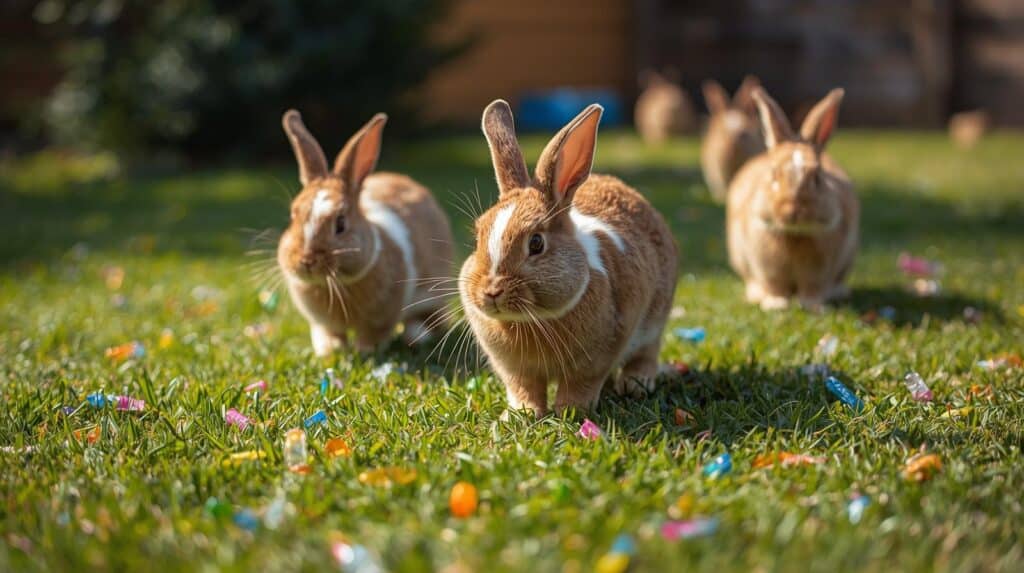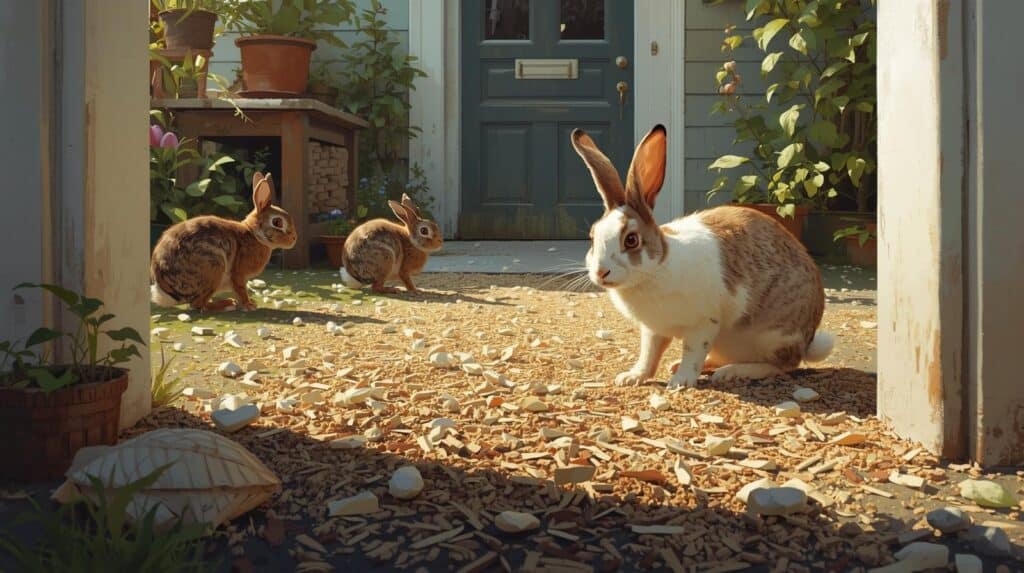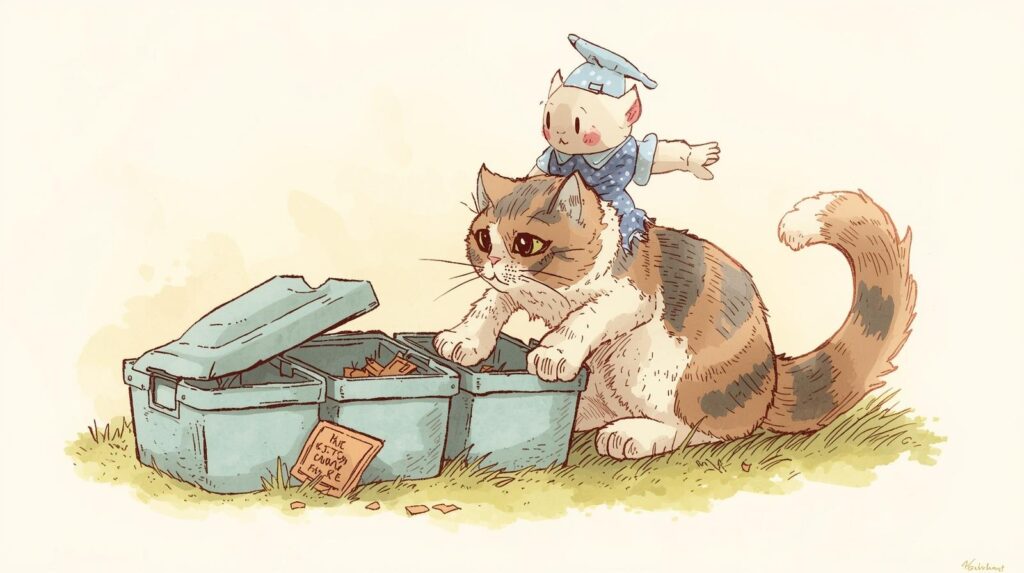
If you’re a gardener, you probably know the frustration of finding your plants nibbled down to the stems overnight. Rabbits may look harmless, but they can cause serious damage to flowers, vegetables, and young shrubs in just a short time.
Over the years, people have tried all sorts of rabbit deterrents—fencing, sprays, motion sensors, and even homemade remedies. Among these unusual tricks, one question pops up often: Can cat litter really help keep rabbits away?
In this article, we’ll explore whether used cat litter works as a rabbit repellent, how it should (and shouldn’t) be used, and what safer alternatives might protect your garden.
Table of Contents
1. Does cat litter keep rabbits away?
Yes, used cat litter can sometimes help keep rabbits away, but it’s not a guaranteed or long-term solution. The smell of cat urine signals a predator’s presence, which may scare rabbits off temporarily. However, results are inconsistent—some gardeners report success, while others see little to no effect. For reliable protection, physical barriers like fencing or other proven rabbit deterrents work much better.
2. Do Rabbits Stay Away from Cat Litter?
Many gardeners believe that used cat litter can act as a rabbit repellent because it carries the scent of a predator. The ammonia and urine smell signals danger, which may discourage rabbits from venturing too close to gardens or flower beds.
There’s also plenty of anecdotal evidence supporting this idea. On gardening forums, some people report success after sprinkling used cat litter around their garden borders. One gardener even noted that rabbits avoided a section of fence treated with cat litter, while the untreated areas still showed signs of rabbit activity.
However, official and scientific sources suggest this method offers only short-term or inconsistent results. Rabbits are adaptable animals; once they realize there’s no real predator present, they may return despite the scent. Experts generally recommend more reliable solutions—such as fencing or repellents—if you want lasting protection.
3. How to Use Cat Litter as a Rabbit Deterrent

If you want to try cat litter as a rabbit repellent, it’s important to know that only used cat litter works. The deterrent effect comes from the scent of cat urine, which signals to rabbits that a predator may be nearby. Fresh, unused litter won’t have the same effect.
The most common method is to sprinkle small amounts of used cat litter along garden borders, near entry points, or around plants that rabbits frequently target. This creates a scent barrier that may discourage them from entering.
However, there are a few important precautions:
- Do not mix cat litter into the soil—it can contaminate the ground and release unpleasant odors.
- Avoid placing it directly on or near plants, as the ammonia and waste can be harmful.
- Use sparingly and reapply after rain, since the scent fades quickly.
Cat litter can provide a temporary deterrent, but it’s best used as part of a broader rabbit-control strategy rather than the sole solution.
4. Risks and Limitations
While used cat litter might work as a rabbit deterrent in some cases, it comes with several drawbacks:
- Not a permanent solution – Rabbits can get used to the smell over time and eventually ignore it.
- Odor problems – Used litter can create strong, unpleasant smells in the garden, especially during hot or rainy weather.
- Unsafe around pet rabbits – If you keep rabbits as pets, never use cat litter in their enclosures or living areas. Many types of cat litter (clumping clay, silica, scented varieties) are toxic if ingested and may cause respiratory or digestive issues.
Because of these risks, cat litter should be considered a temporary or last-resort method, not a long-term strategy.

5. Better Alternatives to Keep Rabbits Away
If you want more reliable and safer ways to protect your garden, here are some proven alternatives:
- Physical barriers – The most effective method is fencing. A chicken wire fence at least 2 feet high, buried 6–12 inches underground, prevents rabbits from digging underneath.
- Natural repellents – Homemade sprays made with garlic, vinegar, or hot pepper can deter rabbits without harming plants. These need to be reapplied after rain.
- Motion-activated deterrents – Devices like sprinklers or lights startle rabbits and keep them away.
- Decoy predators – Owl or hawk decoys, when moved around regularly, can trick rabbits into avoiding the area.
If you’re interested in similar methods with other animals, check out our related guides:
These articles explain how the same principle—predator scent deterrence—can work for different pests, and where it falls short.
5. Products to Use to Keep Rabbits Away
If you’d rather use ready-made solutions instead of DIY methods, here are some effective products that can help keep rabbits out of your garden:
Rabbit Repellent Sprays
- Liquid Fence Rabbit Repellent – Uses garlic and putrescent egg solids to repel rabbits with smell and taste.
- Nature’s Mace Rabbit Repellent – Non-toxic, biodegradable formula safe for plants, kids, and pets.
Granular Rabbit Repellents
- Enviro Pro Rabbit Scram – Granules made from natural ingredients that create a scent barrier around plants.
- Plantskydd Animal Repellent – A blood-meal-based deterrent that lasts longer than sprays.
Fencing & Barriers
- Chicken Wire Fencing (½-inch mesh) – The most reliable, long-term solution.
- Garden Netting or Row Covers – Protects specific plants and young seedlings.
Motion-Activated Devices
- Orbit Yard Enforcer Motion-Activated Sprinkler – Sprays water to scare rabbits away without harm.
- Ultrasonic Rabbit Repellent Devices – Emit sounds that are unpleasant to rabbits but inaudible to humans.
Tip: Combine one or more of these products with physical barriers for maximum effectiveness.
6. Conclusion
While used cat litter may help keep rabbits away for a short time, it is not a reliable long-term solution. Rabbits often adapt to the scent, and the litter itself can create odor problems or even pose health risks if misused.
The good news is that there are safer and more effective options available. Physical barriers like fencing, natural repellents, and motion-activated devices provide consistent protection without the downsides of used cat litter.
For best results, gardeners should use an integrated approach—combining barriers, repellents, and deterrents to create multiple layers of defense. This way, your garden stays safe, and you can enjoy your plants without constant worry about rabbit damage
7. FAQ Section
Does used cat litter repel rabbits?
Yes, used cat litter can sometimes repel rabbits because the smell of cat urine suggests a predator nearby. However, it’s not 100% effective and usually works only for a short time.
Is cat litter safe to use in gardens?
Not really. Used cat litter can introduce unpleasant odors and harmful bacteria into the soil. It should only be placed around garden borders—not mixed with soil or near edible plants.
What smell keeps rabbits away naturally?
Rabbits dislike strong odors such as garlic, vinegar, hot pepper, blood meal, and predator urine. These natural repellents can help keep them out of your garden.
Can I use cat litter indoors to deter rabbits?
No. Cat litter should not be used indoors for rabbit deterrence. It’s unsafe around pet rabbits and can cause respiratory or digestive issues if ingested.
What is the most effective rabbit deterrent?
The most reliable method is physical fencing—specifically chicken wire buried 6–12 inches underground and at least 2 feet high. Natural sprays and motion-activated sprinklers can also add extra protection.


